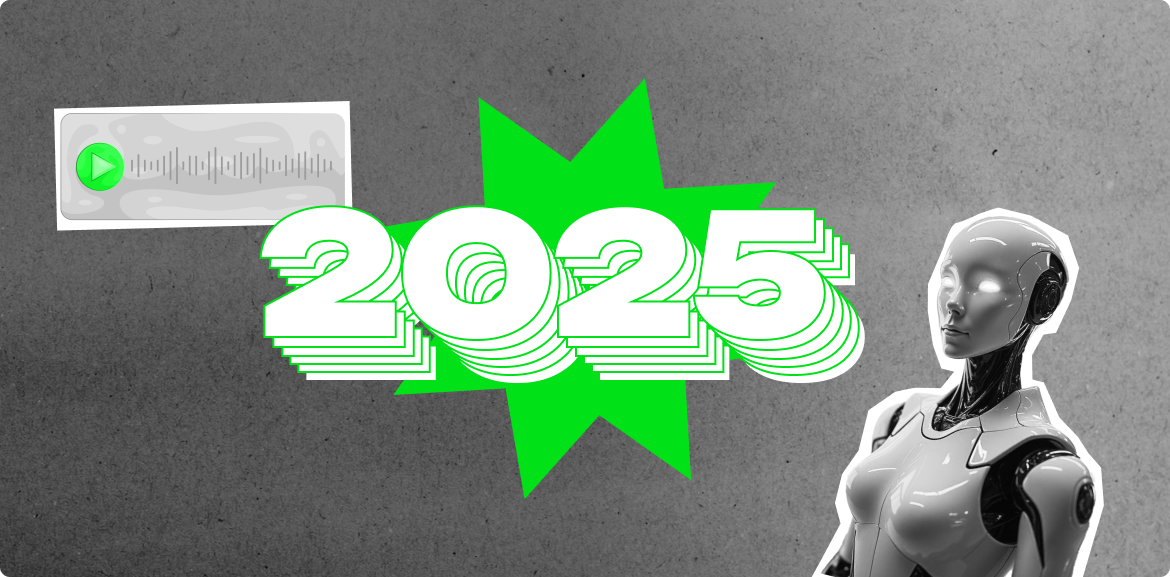Digital Marketing Trends for 2025!

As we approach 2025, we expect to see sweeping changes in the digital marketing realm driven by emerging technologies, particularly AI, changing consumer expectations, and an increased emphasis on data privacy. This article delves into the leading digital marketing trends for 2025, offering essential insights for businesses of all sizes—from agile startups to top-flight organizations. Whether aiming to elevate your brand’s digital footprint or accomplish specific growth targets, understanding these trends will help you prepare ahead for what’s to come.
Trend 1
AI Use Reducing Traditional Search Use
A notable shift is emerging as users increasingly rely on AI tools like ChatGPT to answer queries rather than using traditional search engines like Google. This trend highlights the people’s growing dissatisfaction with the search experience, often hindered by ads, sponsored content, and low-value pages engineered solely for clicks. Unlike search engines that require users to navigate through these obstacles, AI models offer a streamlined experience, generating concise, comprehensive responses immediately.
For businesses and content creators, this AI-driven approach can be a game-changer. Many marketing teams now utilize AI to identify trending topics, ideate social media and blog content, and conduct audience research without wading through irrelevant search results. By inputting specific keywords, users receive targeted insights on audience preferences and pain points, allowing for more refined content strategies. This trend saves considerable time and effort, particularly as AI tools help optimize content by suggesting relevant keywords and refining structure. Thus, while proper prompt crafting remains crucial, AI is rapidly reshaping how people gather information and build digital strategies.
Trend 2
Content Optimization with AI
In 2025, content optimization with AI will be a defining trend in digital marketing, enhancing how businesses reach and engage audiences. A major element of this trend is personalization, where AI customizes content recommendations based on user behavior, past interactions, and preferences. Leading platforms like Netflix, YouTube, and Spotify rely on AI algorithms to deliver uniquely tailored suggestions to keep users engaged. By leveraging data insights, AI can predict and serve content that aligns with individual interests, significantly enhancing user satisfaction and retention. This approach allows brands to deliver highly relevant content that resonates on a personal level, building stronger customer loyalty.
AI also elevates SEO and text optimization, allowing content creators to refine their text for better search visibility. Tools powered by AI not only recommend keywords to improve search rankings but also provide suggestions for structure, readability, and engagement. These tools enable marketers to create content that appeals to both users and search engines, ensuring higher visibility across digital channels. Additionally, AI can identify trends, anticipate shifts in search behavior, and suggest topic ideas that align with emerging interests, positioning brands at the forefront of their industry.
Furthermore, automated A/B testing powered by AI is revolutionizing how marketers evaluate and optimize content performance. Instead of the traditional, time-consuming A/B testing process, AI-driven platforms now compare multiple versions of content—such as email campaigns, social media posts, or ads—in real time to determine which delivers the best results. This real-time testing and adjustment reduce guesswork, enabling marketers to fine-tune content quickly and efficiently for maximum engagement. In 2025, these AI-driven capabilities allow businesses to make data-informed decisions at a scale and speed previously unattainable, driving more effective content strategies and stronger outcomes in digital marketing.
Trend 3
Growth of AI-Supported Ad Creation and Optimization
The year 2025 is set to witness a major shift in how advertising is created and optimized, with AI-supported tools taking center stage. With AI-powered ad generators, businesses can now produce ad copy, visuals, and targeting strategies by extracting key insights, saving countless hours traditionally spent on manual ad creation. This streamlined approach not only delivers more engaging ads but also significantly reduces what’s known as GTM (go-to-market) bloat, helping companies cut ad spend and improve return on investment.
AI can refine every aspect of ad content—from tweaking visuals to adjusting copy and layout for maximum impact—all in a fraction of the time required by traditional A/B testing. Unlike conventional methods that might take weeks and exhaust 30-50% of a media budget to gauge ad effectiveness, AI-enabled systems can use past data and pattern recognition to generate a high-performing ad mix almost instantly. This approach allows marketers to test and iterate on hundreds or even thousands of ad versions simultaneously, predicting with high accuracy which ones will resonate best with audiences.
By leveraging AI’s advanced analytics, marketers can evaluate each creative decision in real time and focus only on high-performing content. For instance, AI heatmaps, which visualize how much attention different parts of an ad attract, enable brands to emphasize key elements like calls-to-action, logos, and product images. This is especially useful for retail and e-commerce, where these insights can be applied to optimize product displays online and even on physical shelves. Instead of wasting time and budget on lengthy testing phases, AI provides instant feedback and allows brands to pivot quickly, making every ad dollar go further in 2025’s fast-paced digital landscape.

Trend 4
Voice and Visual Search to Gain Traction
With advances in AI, voice and visual search will become more widespread, changing how users interact with digital content. Voice search is rapidly growing as people adopt conversational interactions with their devices, making it crucial for businesses to optimize content for natural language input. Unlike typed queries, voice searches reflect natural speech patterns and tend to be more specific and question-based. For example, users might ask, “What’s the best Italian restaurant near me?” rather than typing “best Italian restaurant.” To stay relevant in this space, brands will need to structure content that aligns with these conversational dynamics, creating FAQs and informative answers that cater to voice-driven inquiries.
Visual search is also gaining traction, thanks to advancements in image recognition technology. This capability allows users to conduct searches by uploading images instead of text-based queries. For businesses, this shift emphasizes the need for optimizing visual assets so they are easily discoverable and contextually accurate. High-quality images with descriptive alt text, appropriate tags, and contextual relevance become essential for brands to remain competitive. As these search methods gain popularity, businesses can enhance their reach by focusing on semantic understanding and adapting to these emerging technologies, solidifying their place in a fast-evolving digital landscape.
Trend 5
Greater Focus on Secure Handling of Data
In 2025, a privacy-first approach to marketing will become highly essential as companies respond to increasing regulations like GDPR in Europe and CCPA in California, which mandate strict standards for handling user data. AI tools, especially those used in customer-facing roles like chatbots, collect extensive data during interactions, making it critical for businesses to establish clear data-handling protocols. Key to these protocols is obtaining explicit user consent before data collection. This requires informing users precisely about the data being collected, the purpose behind it, and ensuring they agree to this before any data exchange begins. To further safeguard user privacy, companies will adopt a data minimization approach—collecting only the data essential for fulfilling a specified purpose. Additionally, robust data storage security measures like encryption will become vital to prevent unauthorized access and breaches, especially as AI tools manage increasingly personal and sensitive data. Also, to uphold user trust, companies will be mandated to use data strictly for the purpose for which consent was obtained, limiting access to only those employees directly involved in the task.
Trend 6
Interactive Content Set to Become More Important
In 2025, interactive and experiential content will play a bigger role as brands shift toward creating more engaging and memorable experiences for audiences. Instead of traditional static content, marketers will prefer to rely on dynamic elements like quizzes, polls, and interactive infographics to enhance user interaction and forge deeper brand connections. This strategy aligns well with evolving consumer expectations, as people increasingly seek engaging and meaningful interactions with brands, rather than passively consuming content. Additionally, interactive content will strengthen brand recall. By crafting experiences that are both informative and enjoyable, brands will be able to leave a lasting impression that goes beyond a simple advertisement or post. For example, incorporating interactive videos or augmented reality (AR) elements provides a unique touchpoint that can resonate with consumers long after they’ve left the brand’s website or social media page. As a result, the emphasis on experiential marketing in 2025 will help brands differentiate themselves in a crowded digital landscape, making interactions with their audience not only memorable but also data-rich and strategically valuable.
Trend 7
Marketers to Leverage Power of Reddit in Their SEO Strategy
Reddit has been seeing a big surge in visibility when it comes to the Google Search results pages, making marketers sit up and take note. As per data from Sistrix, Reddit registered a 1,328 percent increase in SEO visibility on Google between July 2023 and April 2024. It also receives about 11.4 million clicks daily from Google searches. This is likely to make it the ideal platform for brand marketing in 2025. Businesses are expected to make use of Reddit to promote their content, build trust, increase brand awareness, and improve their own website rankings.




![[photo]](https://edna.io/wp-content/themes/edna/images/authors/rajrupa-ghoshal.jpg)
![[icon]](https://edna.io/wp-content/themes/edna/images/authors/ico-linkedin.svg)